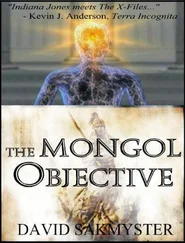David Sakmyster - The Pharos Objective
Здесь есть возможность читать онлайн «David Sakmyster - The Pharos Objective» весь текст электронной книги совершенно бесплатно (целиком полную версию без сокращений). В некоторых случаях можно слушать аудио, скачать через торрент в формате fb2 и присутствует краткое содержание. Жанр: Прочие приключения, на английском языке. Описание произведения, (предисловие) а так же отзывы посетителей доступны на портале библиотеки ЛибКат.
- Название:The Pharos Objective
- Автор:
- Жанр:
- Год:неизвестен
- ISBN:нет данных
- Рейтинг книги:3 / 5. Голосов: 1
-
Избранное:Добавить в избранное
- Отзывы:
-
Ваша оценка:
- 60
- 1
- 2
- 3
- 4
- 5
The Pharos Objective: краткое содержание, описание и аннотация
Предлагаем к чтению аннотацию, описание, краткое содержание или предисловие (зависит от того, что написал сам автор книги «The Pharos Objective»). Если вы не нашли необходимую информацию о книге — напишите в комментариях, мы постараемся отыскать её.
The Pharos Objective — читать онлайн бесплатно полную книгу (весь текст) целиком
Ниже представлен текст книги, разбитый по страницам. Система сохранения места последней прочитанной страницы, позволяет с удобством читать онлайн бесплатно книгу «The Pharos Objective», без необходимости каждый раз заново искать на чём Вы остановились. Поставьте закладку, и сможете в любой момент перейти на страницу, на которой закончили чтение.
Интервал:
Закладка:
If Caleb had ever wanted to get back into the hunt, Phoebe had just given him the means to take the first step.
2
Alexandria-March
Nolan Gregory sat in a wicker chair on his son’s seventh-floor balcony. The apartment, while somewhat light on luxury, had a strategic view from its western side, at least for certain interested people. Nolan had observed this very scene every night for almost two decades, beginning with every move the bulldozers had made below, every truck carrying away the ruined pieces of old warehouses, apartments and abandoned shacks. Now, he gazed with pride at the glass domed rooftop of the massive library, marveling at the crowds, the tourists, the scholars.
“It’s been five hours,” his son said from inside the screen. “Can I at least get you another drink?”
Nolan shook his head as he continued to watch. “No, Robert. I’m fine. I should be going.” In his mind he visualized the layout below the dome, remembering the excavation of the sub-levels, the laying of the foundations, the steel girders. He thought of the precision needed to connect to their sub-level, already in place one hundred feet below. So much to think about, so much to supervise. All from behind the scenes of course. A dozen firms had been brought in, capital from so many organizations, interested benefactors, governments and private donors. Consultants, architects, linguists, sociologists.
Such a project. It had easily consumed the last twenty years of his life. Two decades that had seen his children grow from precocious teenagers to successful adults, each with their own lives-his son here, his daughter overseas.
But each of them Keepers. Valued colleagues.
The screen opened and Robert came out, leaned on the ledge and looked down. His blond hair rippled in the soft breezes. His piercing blue eyes followed his father’s gaze, looking down at the structure with something more like jealousy and impatience. “I’m uncomfortable with your plans for the Key’s retrieval,” he said.
“I know,” Nolan replied, “I know. But it’s the only way. We’ve been lucky so far. Lucky the son has turned his back on his talents, and lucky he’s distanced himself from his family. He’s given us time.”
“Must we move now?” Robert asked. “Waxman is getting nowhere. He’s given up.”
“Wishful thinking. He’s only biding his time, still hoping the other psychics can help him. Fortunately, Helen and Phoebe Crowe haven’t succeeded, but it’s only a matter of time at this point. One of them will find the Key if we don’t get it first.”
Robert lowered his head as the smell of curry and raisins filtered out from the kitchen, where his mother was busy making their evening meal. “So it has to be this way.”
“Yes.”
“And she has agreed?”
Nolan sighed, again gazing at the shimmering reflection of the sun’s setting light off the glass dome, and he told himself that whatever the personal risks, it was worth it. “She’s ready.”
3
New York City-October
The remainder of Caleb’s research, six months before a fury of writing and revisions, passed in a blur of old books, dank library archives, endless hours in museums and the rare book sections of various universities. He needed his own place, needed the isolation and quiet to see the project through. And so he holed up in a Manhattan 72 ^nd Street studio apartment, one where he just barely met the rent payments by clerking in the Classics section at the New York Library during the summer. But that was all about to change.
Six months ago he had secured an agent, a publisher, and a $50,000 advance on a work entitled The Life and Times of the Alexandrian Library. It was the culmination of reams of notes, anecdotes, theories and research. Advance praise was extraordinary; it was being hailed as “a classic with epic non-fictional characters that seem so lifelike it’s as if Caleb Crowe has actually stepped back in time and observed the places and events in person.”
There was, of course, some truth to the statement. Although he had sworn off using any form of psychic abilities since Nina’s death, sometimes his subconscious, overwhelmed with the intensity of the research and late-night writing, took over with its own agenda. It would yank him into a waking dream to stroll among philosophers in white robes, their voices echoing off the alcoves as they spoke to rapt pupils. He would wander the ten colossal chambers of learning, savoring the breath of ancient truth exuding from the scrolls held therein. He would peer out the windows, looking past the dark silhouette of the Pharos Lighthouse and up into the heavens where his fellow scholars had mapped out the trails of the gods.
He had rubbed shoulders with Euclid, drunk wine with Claudius Ptolemy, dissected corpses with Aristarchus, charted the cycles of Venus with Hipparchus, and tinkered alongside Heron. And all of those experiences-the sights and sounds, the flavor of those revered halls and the luxurious museum grounds-they all made their way into his book as revelations and wonders and theories that modern scholars and critics were fast to admonish; yet something about his forceful style and the strength in his words proved irresistibly satisfying to readers.
Today was his first book signing, at a trendy cafe in Soho on a late October afternoon. A steady, drizzling rain tapped against the windows, and the cabs squealed out front while shoppers scurried by. The thick aroma of coffee permeated the air. Caleb’s stomach was tangled up in binding knots, and his voice was on the verge of cracking. More than forty people had packed the small room, a host of multicolored umbrellas and rain slickers-and one bright orange shawl beneath a grinning face.
Phoebe was there, in the back of the room, hands folded, a copy of his book in her lap. The lustrous metal handles on the chair glistened with raindrops. Her surprising appearance-the first time Caleb had seen her since Christmas-was all he needed to gather his courage, to relax and let the words flow.
He spoke of the incalculably valuable storehouse of knowledge lost in the library’s destruction. Briefly, he highlighted the acquisition of books from around the world and how the library and the museum served as the world’s first university. He touched on the great names associated with the museum and the scrolls. He spoke of Kallimakhos and his innovative cataloging method that led to the current card catalog system; then he turned to speculation of what major works had been lost forever. According to surviving memoirs, biographies and other histories, among the lost works were plays of Homer, Plato and Virgil; mathematical treatises by Euclid; medical texts that described treatments for what remain today incurable diseases. Then there were metaphysical texts, spiritual guides to awaken the soul and expand one’s consciousness.
Next, so as not to bore them completely, Caleb turned to the major theories about the catastrophic destruction of all this knowledge, delving into the bloodshed and intolerance that had brought all these works to flames. He spoke of Caesar and the later Roman emperors who, in their zeal to crush Alexandrian rebellions, had inadvertently or consciously torched sections of the library. He spoke of Emperor Theodosius’s decrees that had incited the Christian mobs in 391 AD, and even touched on the questionable theory that Arab conquerors had depleted the library’s scrolls as a means to heat the city’s steam baths, citing the famous order of destruction from the caliph of Cairo: “The scrolls either contradict the Koran, in which case they are heresy, or they agree with it, so they are superfluous.”
About halfway through his presentation, Caleb looked up and saw another bright face watching from the counter beside a gold-plated espresso machine. A blond-haired woman looked across the room through narrow-rimmed glasses. She wore a neat gray suit over a tight yellow blouse. For some reason, despite the enthralled stares of the others, young and old packing the tables and chairs, her attention made Caleb uncomfortable.
Читать дальшеИнтервал:
Закладка:
Похожие книги на «The Pharos Objective»
Представляем Вашему вниманию похожие книги на «The Pharos Objective» списком для выбора. Мы отобрали схожую по названию и смыслу литературу в надежде предоставить читателям больше вариантов отыскать новые, интересные, ещё непрочитанные произведения.
Обсуждение, отзывы о книге «The Pharos Objective» и просто собственные мнения читателей. Оставьте ваши комментарии, напишите, что Вы думаете о произведении, его смысле или главных героях. Укажите что конкретно понравилось, а что нет, и почему Вы так считаете.












